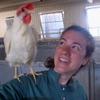
MSc & PhD in Animal Biosciences (Thesis/Research)
Discover new knowledge and advance animal science.
The MSc and PhD in Animal Biosciences are offered through our Department of Animal Biosciences, a research-intensive department focused on Animal Breeding and Genetics, Animal Nutrition and Metabolism, Animal Physiology, and Animal Behaviour and Welfare. Graduate students can also conduct research as part of three collaborative programs with other departments: Bioinformatics, Neuroscience, and Toxicology.
Regardless of your specialization, you will learn through “hands on” experiential research opportunities with your faculty advisor and focus on your species of interest: dairy and beef cattle, laying hens, dogs and cats, zoo animals, horses, or laboratory animals, such as mice and rats.
Publish research
Students in the MSc and PhD Animal Bioscience programs publish on average one paper per year and present at conferences at least once annually.
World-class faculty
Tap into the knowledge and expertise of the 25+ faculty in the Department of Animal Biosciences and their associated colleagues in government and industry.
Expand your network
Join a thriving community of over 130 graduate students from 20+ countries who share similar interests and career goals.
90% employment rate
Within 6 months of graduating, over 90% of animal bioscience graduate students go on to future training or careers related to their graduate research.
Access unique facilities
Learn in high-quality research and lab facilities focused on genomics, nutrient analyses, physiology, welfare, meats and microbiology.
Niche research centres
Gain knowledge and connections from the Campbell Centre for the Study of Animal Welfare, Centre for Genetic Improvement of Livestock, Aquaculture Centre and Centre for Nutrition Modelling.
Both programs are offered in-person at the Guelph campus. The MSc typically takes two (2) years, while the PhD takes three to four (3-4) years to complete.
- Scientific Communication, Knowledge Dissemination and Professional Development (required)
- Modelling Metabolic Processes
- Quantitative Genetics and Animal Models
- Advanced Animal Nutrition and Metabolism
- Assessing Animal Welfare in Practice
- Topics in Animal Biotechnology
- Topics in Computational Biology and Bioinformatics
This is just a sample of the course options. View all Animal Biosciences graduate courses here.
- Geneticist
- Research associate
- Scientific director
- Data scientist
- Consultant
- Nutritionist
Graduates from the Department of Animal Biosciences have careers in diverse fields. We recently conducted a career destination survey of 467 master’s graduates and 161 PhD graduates of the department. View the results here: View the results here:
- MSc students receive a minimum stipend of $20,270 per year*
- PhD students receive a minimum stipend of $ 24,230 per year*
* Minor scholarships ($5,000 or under a year) and TA-ships are not counted as part of this stipend; Further details are available on the Department of Animal Biosciences Stiped Policy webpage. Many animal biosciences graduate students also compete successfully for University of Guelph scholarships and awards.
More details on funding your graduate studies are available on the Graduate & Postdoctoral Studies website.

More information on courses and admission requirements can be found here.

Learn at world-class research facilities
As a graduate student, you’ll access world-class research facilities across Ontario specializing in dairy, aquaculture, equine, poultry, swine, beef and more. Work with leading researchers using advanced technologies in animal health, nutrition, and production, gaining hands-on experience that drives innovation and real-world impact in the agri-food sector.
Meet Your Profs
How to Apply
As part of the application requirements, you are required to secure a faculty advisor to supervise your program. Our faculty profiles on the Department of Animal Biosciences website describe research programs in more detail. Contact the faculty member you are interested in working with to discuss potential research opportunities. We recommend connecting via email.
- An honours baccalaureate, with a minimum average grade of `B' during the last 2 years of full-time equivalent study. For Canadian degrees, we interpret this as the last 20 semester courses, however we do not split a semester and we will not consider any fewer than 16 courses.
-
In general, a minimum average grade of `B' for a completed MSc program plus strong letters of reference are required. Students wishing to be considered for transfer to a PhD program prior to completion of the MSc program must request the transfer before the end of the fourth semester and have an excellent academic record as well as a strong aptitude for research.
-
Direct admission to the PhD program may be permitted for applicants who hold a bachelor's degree and have an excellent academic history and strong indications of research potential.
There are no deadlines as applications are accepted on an ongoing basis.
We recommend that you apply online at least 3 months before the start of semester if you're a Canadian student. If you're an international student, you'll need to allow time for visa approval as well, please apply at least 6 months before the start of semester.
More details on the U of G graduate program application process here.
- Not sure what your “admission average” is? Here’s more details on how to calculate it: Calculating Your Admission Average | Graduate & Postdoctoral Studies
- International applicants: please use this guide to compare your academic credentials and determine the grade equivalency needed. Additional information available on the International Applicants page.
- If your first language is not English, you will be required to submit the results of a standardized language test. Please refer to the Office of Graduate Studies website for the required English Language Proficiency acceptable tests and required scores.
- More resources for international applicants are available on the U of G Graduate & Postdoctoral website.
Additional Options
You may also be interested in Master of Animal Biosciences (Course-based).
Contact
For questions on applying and admissions, contact:
Chantelle Prigione, Grad Program Assistant
abscgradthesis@uoguelph.ca
Department of Animal Biosciences
For questions on graduate program options, contact:
Leigh West
Ontario Agricultural College (OAC)
lewest@uoguelph.ca
519-824-4120 Ext. 52101
Hear from Animal Biosciences Graduate Students

I have the opportunity to work directly with industry professionals and leaders in genomic research. This access to outstanding resources has allowed me to acquire skills in new technologies and methodologies that are being implemented in the field of Animal Breeding and Genetics. In this highly competitive global marketplace, I know a Ph.D. from the University of Guelph will give me a competitive advantage.









